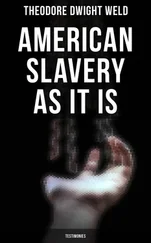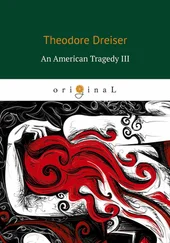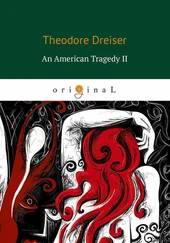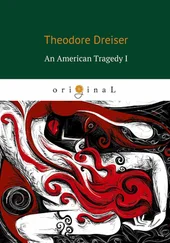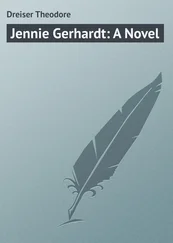Theodore Dreiser - An American Tragedy
Здесь есть возможность читать онлайн «Theodore Dreiser - An American Tragedy» — ознакомительный отрывок электронной книги совершенно бесплатно, а после прочтения отрывка купить полную версию. В некоторых случаях можно слушать аудио, скачать через торрент в формате fb2 и присутствует краткое содержание. Жанр: unrecognised, на английском языке. Описание произведения, (предисловие) а так же отзывы посетителей доступны на портале библиотеки ЛибКат.
- Название:An American Tragedy
- Автор:
- Жанр:
- Год:неизвестен
- ISBN:нет данных
- Рейтинг книги:5 / 5. Голосов: 1
-
Избранное:Добавить в избранное
- Отзывы:
-
Ваша оценка:
- 100
- 1
- 2
- 3
- 4
- 5
An American Tragedy: краткое содержание, описание и аннотация
Предлагаем к чтению аннотацию, описание, краткое содержание или предисловие (зависит от того, что написал сам автор книги «An American Tragedy»). Если вы не нашли необходимую информацию о книге — напишите в комментариях, мы постараемся отыскать её.
An American Tragedy — читать онлайн ознакомительный отрывок
Ниже представлен текст книги, разбитый по страницам. Система сохранения места последней прочитанной страницы, позволяет с удобством читать онлайн бесплатно книгу «An American Tragedy», без необходимости каждый раз заново искать на чём Вы остановились. Поставьте закладку, и сможете в любой момент перейти на страницу, на которой закончили чтение.
Интервал:
Закладка:
At the same time, being confronted by this problem of how soon they would be wanting to go to a place into which he had never ventured before, and to be doing things which he had never let himself think he would do in just this way, he was just a little disturbed. Had he not better excuse himself after they got outside, or perhaps, after starting along with them in whatsoever direction they chose to go, quietly slip away at some corner and return to his own home? For had he not already heard that the most dreadful of diseases were occasionally contracted in just such places—and that men died miserable deaths later because of low vices begun in this fashion? He could hear his mother lecturing concerning all this—yet with scarcely any direct knowledge of any kind. And yet, as an argument per contra, here were all of these boys in nowise disturbed by what was in their minds or moods to do. On the contrary, they were very gay over it all and amused—nothing more.
In fact, Ratterer, who was really very fond of Clyde by now, more because of the way he looked and inquired and listened than because of anything Clyde did or said, kept nudging him with his elbow now and then, asking laughingly, "How about it, Clyde? Going to be initiated to-night?" and then smiling broadly. Or finding Clyde quite still and thinking at times, "They won't do more than bite you, Clyde."
And Hegglund, taking his cue from Ratterer and occasionally desisting from his own self-glorifying diatribes, would add: "You won't ever be de same, Clyde. Dey never are. But we'll all be wid you in case of trouble."
And Clyde, nervous and irritated, would retort: "Ah, cut it out, you two. Quit kidding. What's the use of trying to make out that you know so much more than I do?"
And Ratterer would signal Hegglund with his eyes to let up and would occasionally whisper to Clyde: "That's all right, old man, don't get sore. You know we were just fooling, that's all." And Clyde, very much drawn to Ratterer, would relent and wish he were not so foolish as to show what he actually was thinking about.
At last, however, by eleven o'clock, they had had their fill of conversation and food and drink and were ready to depart, Hegglund leading the way. And instead of the vulgar and secretive mission producing a kind of solemnity and mental or moral self-examination and self-flagellation, they laughed and talked as though there was nothing but a delicious form of amusement before them. Indeed, much to Clyde's disgust and amazement, they now began to reminisce concerning other ventures into this world—of one particular one which seemed to amuse them all greatly, and which seemed to concern some "joint," as they called it, which they had once visited—a place called "Bettina's." They had been led there originally by a certain wild youth by the name of "Pinky" Jones of the staff of another local hotel. And this boy and one other by the name of Birmingham, together with Hegglund, who had become wildly intoxicated, had there indulged in wild pranks which all but led to their arrest—pranks which to Clyde, as he listened to them, seemed scarcely possible to boys of this caliber and cleanly appearance— pranks so crude and disgusting as to sicken him a little.
"Oh, ho, and de pitcher of water de girl on de second floor doused on me as I went out," called Hegglund, laughing heartily.
"And the big fat guy on the second floor that came to the door to see. Remember?" laughed Kinsella. "He thought there was a fire or a riot, I bet."
"And you and that little fat girl, Piggy. 'Member, Ratterer?" squealed Shiel, laughing and choking as he tried to tell of it.
"And Ratterer's legs all bent under his load. Yoo-hoo!" yelled Hegglund. "And de way de two of 'em finally slid down de steps."
"That was all your fault, Hegglund," called Higby from Kinsella's side. "If you hadn't tried that switching stuff we never woulda got put out."
"I tell you I was drunk," protested Ratterer. "It was the red-eye they sold in there."
"And that long, thin guy from Texas with the big mustache, will you ever forget him, an' the way he laughed?" added Kinsella. "He wouldn't help nobody 'gainst us. 'Member?"
"It's a wonder we weren't all thrown in the street or locked up. Oh, gee, what a night!" reminisced Ratterer.
By now Clyde was faintly dizzy with the nature of these revelations. "Switchin'." That could mean but one thing.
And they expected him to share in revels such as these, maybe. It could not be. He was not that sort of person. What would his mother and father think if they were to hear of such dreadful things? And yet—
Even as they talked, they had reached a certain house in a dark and rather wide street, the curbs of which for a block or more on either side were sprinkled with cabs and cars. And at the corner, only a little distance away, were some young men standing and talking. And over the way, more men. And not a half a block farther on, they passed two policemen, idling and conversing. And although there was no light visible in any window, nor over any transom, still, curiously, there was a sense of vivid, radiant life. One could feel it in this dark street. Taxis spun and honked and two old-time closed carriages still in use rolled here and there, their curtains drawn. And doors slammed or opened and closed. And now and then a segment of bright inward light pierced the outward gloom and then disappeared again. Overhead on this night were many stars.
Finally, without any comment from any one, Hegglund, accompanied by Higby and Shiel, marched up the steps of this house and rang the bell. Almost instantly the door was opened by a black girl in a red dress. "Good evening. Walk right in, won't you?" was the affable greeting, and the six, having pushed past her and through the curtains of heavy velvet, which separated this small area from the main chambers, Clyde found himself in a bright and rather gaudy general parlor or reception room, the walls of which were ornamented with gilt-framed pictures of nude or semi-nude girls and some very high pier mirrors. And the floor was covered by a bright red thick carpet, over which were strewn many gilt chairs. At the back, before some very bright red hangings, was a gilded upright piano. But of guests or inmates there seemed to be none, other than the black girl.
"Jest be seated, won't you? Make yourselves at home. I'll call the madam." And, running upstairs to the left, she began calling: "Oh, Marie! Sadie! Caroline! They is some young gentlemen in the parlor."
And at that moment, from a door in the rear, there emerged a tall, slim and rather pale-faced woman of about thirty-eight or forty— very erect, very executive, very intelligent and graceful-looking— diaphanously and yet modestly garbed, who said, with a rather wan and yet encouraging smile: "Oh, hello, Oscar, it's you, is it? And you too, Paul. Hello! Hello, Davis! Just make yourselves at home anywhere, all of you. Fannie will be in in a minute. She'll bring you something to drink. I've just hired a new pianist from St. Joe—a Negro. Wait'll you hear him. He's awfully clever."
She returned to the rear and called, "Oh, Sam!"
As she did so, nine girls of varying ages and looks, but none apparently over twenty-four or five—came trooping down the stairs at one side in the rear, and garbed as Clyde had never seen any women dressed anywhere. And they were all laughing and talking as they came—evidently very well pleased with themselves and in nowise ashamed of their appearance, which in some instances was quite extraordinary, as Clyde saw it, their costumes ranging from the gayest and flimsiest of boudoir negligees to the somewhat more sober, if no less revealing, dancing and ballroom gowns. And they were of such varied types and sizes and complexions—slim and stout and medium—tall or short—and dark or light or betwixt. And, whatever their ages, all seemed young. And they smiled so warmly and enthusiastically.
Читать дальшеИнтервал:
Закладка:
Похожие книги на «An American Tragedy»
Представляем Вашему вниманию похожие книги на «An American Tragedy» списком для выбора. Мы отобрали схожую по названию и смыслу литературу в надежде предоставить читателям больше вариантов отыскать новые, интересные, ещё непрочитанные произведения.
Обсуждение, отзывы о книге «An American Tragedy» и просто собственные мнения читателей. Оставьте ваши комментарии, напишите, что Вы думаете о произведении, его смысле или главных героях. Укажите что конкретно понравилось, а что нет, и почему Вы так считаете.



